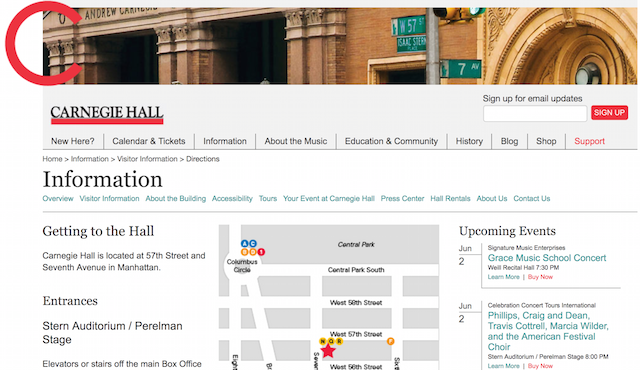A New Yorker (or in some versions Arthur Rubinstein) is approached in the street near Carnegie Hall, and asked, “Pardon me sir, how do I get to Carnegie Hall?” He replies, “Practice, practice, practice.” (Wikipedia)
We’ve all heard the old Carnegie Hall joke (well, at least those of us above a certain age have). In more recent times, you may have caught the buzz about the importance of “10,000 hours” as popularized by Malcom Gladwell in Outliers. The message in both cases it that if you really want to excel at something, a lot of time and a lot of practice are required.
The time part seems straightforward enough, but I know from my own love/hate experience with learning the guitar over many years that simply clocking hours of practice is not enough. The practice has to be of a certain quality. As Anders Ericsson has argued in his body of work on the topic, it has to be deliberate practice.
The right sort of practice carried out over a sufficient period of time leads to improvement. Nothing else. – Anders Ericsson
I found an interesting take on the concept of deliberate practice a while back in an article on “expert performance” in the Strategic Entrepreneurship Journal. I recommend the full article. If you can motivate yourself to read and take notes on the whole thing (it is, as might be expected, a bit long and academic), I think you will find some great wisdom in it. You don’t have to consider yourself an entrepreneur to benefit from the insights – they apply broadly.
Whether or not you read the whole thing, here are eight key features of deliberate practice as it is discussed in the article. I’ve provided my own gloss on each:
1. Deliberate practice is highly demanding mentally, requiring high levels of focus and concentration.
You’ve heard it before – no pain, no gain. But the authors also stress that you have to be “fully absorbed” in your practice for it to truly be effective. This is partly a matter of discipline, but it is even more a matter of tapping your sources of implicit motivation – it’s very hard to keep at this kind of practice if you are not clear about why doing it matters to you.
2. It is designed specifically to improve performance—to strengthen it beyond its current levels.
This is the part that says you can’t just put in time and expect to get significantly better at anything – you have to consistently stretch yourself, and then stretch some more. I do my best to keep this in mind, for example, when I am practice the piano and fall into just practicing scales mindlessly or playing the same old songs again and again.
Purposeful practice requires getting out of one’s comfort zone. This is perhaps the most important part of purposeful practice. – Anders Ericsson
3. It must continue for long of periods of time.
This is Gladwell’s 10,000 hours/10 years. The authors go on to say “Basic research on expert performance suggests that the benefits it generates cannot usually be attained with less than 10 years of continued, vigorous effort (e.g., Ericsson, 2006).” “10,000” is an average, of course, and one that depends on a lot of other factors – including all of those listed here.
4. It must be repeated.
Even though repetition alone won’t get you to the level of excellence, you also won’t get there without it. Perhaps this why the word “Practice” is repeated three times in the old joke. In my experience, there are very few areas of life in which achieving true excellence doesn’t require some level of practice pretty much every day.
As a rule of thumb, I think that anyone who hopes to improve skill in a particular area should devote an hour or more each day to practice that can be done with full concentration. – Anders Ericcson
5. It requires continuous feedback on results.
Sometimes you can tell on your own whether you are doing things right. I know when I hit a wrong note on the guitar, for example. But very often this is the area where having a great teacher, coach, or mentor can make all the difference. I know that personally I don’t seek outside guidance often enough. You may want to consider whether you do.
Purposeful practice involves feedback. You have to know whether you are doing something right and, if not, how you’re going wrong. – Anders Ericcson
6. Pre-performance preparation is essential.
This is where goal setting comes in – you have to know where you want to go if you expect to get there. And as the authors stress, goal-setting “should involve not merely outcomes, but also the processes involved in reaching predetermined goals.” In other words, you need to have a plan, and having one helps tremendously with sticking to the points above.
7. It involves self-observation and self reflection.
As you practice, you need to be continually aware of your own performance and be focused on correcting and adapting as appropriate. This kind of in-the-moment self-assessment is critical regardless of whether a teacher is involved. You have to develop a strong ability to objectively assess your own performance so that you can make any necessary adjustments to your practice.
8. It involves careful reflection on performance after practice sessions are completed.
In addition to being aware of your performance as you are practicing, you need to look back on it once you are done and determine where you stand with respect to your overall goals. You need to continue to reflect and adjust over time as you make progress toward your goals. What might you change to ensure ongoing progress? (See my thoughts on reflection as a learning habit and on becoming a reflection ninja.)
Deliberate practice is purposeful practice that knows where it is going and how to get there. – Anders Ericsson
As noted earlier, the overall focus of this article is on entrepreneurship, but regardless of whether you are an entrepreneur, I think you will find many insights here that are useful to practice in your own particular area of interest. Given that “entrepreneurship” is a somewhat fuzzy area, however, the article may be especially helpful to you if you are pursuing interests that are not as straightforward as learning a musical instrument or a new language.
Whatever you are pursing, if excellence is your goal, be sure to practice, practice, practice – and be deliberate about it.
How does deliberate practice factor in to your learning habits? Please comment and share with other readers.
Jeff
P.S. – Also be sure to check out why practice may not be enough.
P.P.S. – The quotes from Anders Ericsson throughout this post come from his book Peak: Secrets from the New Science of Expertise, which was published well after this post was originally published. Obviously, I’ve made some updates – and, of course, I have read Ericsson’s book, which I now highly recommend to you.






Daniel – Thanks for commenting. I agree it would be misleading, which is why I do not claim that in the article. Nor do any of the sources. “10,000 hours” is generally viewed as necessary, but not sufficient for achieving excellence. I recognize also that there are exceptions, but as it usually the case, those only tend to prove the rule.
You may also want to see: https://www.missiontolearn.com/2011/11/why-practice-practice-practice-may-not-get-you-to-carnegie-hall/
Jeff
And 1 more thing,what about all the prodigies who were expert at some difficult task by the time they were 4 years old? Kinda dispells the 10 year theory!
I think it is misleading to tell individuals they can become expert at anything,and that congenital factors can not limit them.When you consider the facts, the concept of all individuals having the same ultimate potential becomes impossible to endorse. Theres a lot going around about this 10 000 hour deliberate practice business,but other research suggests most people who do 10 000 hours of deliberate practice do not acheive expertise as a result.
Why is it that we all accept outright that once you are over a certain age,it is impossible to pursue elite sport such as tennis or football.We understand that age produces certain changes within the body that simply forbid us performing in a way that a young person can.No system of effort or strategy can overcome this.We accept that once these changes have taken place,it is all over. Now consider that congenital and genetic factors produce differences in a human mind and body which are no less significant than the differences between young and old individuals.Why is it impossible to accept that these differences place absolute boundaries on what level we can perform at,just as we know that optimism or perserverence can not counter the effects of age and the biological changes it brings? There is absolutely no trainer in the world who will take on a 50 year old swimming student,simply because they know there are biological factors that mean the individual will simply be able to perform to standard.They know they are wasting their time.
Why would it be different for young people with varying degrees of neurological and physiological development?
Pingback: Why are some people are more driven than others?? |
I’m not convinced we can, George. The motivation for deliberate practice has to be intrinsic – at least at its core. We can help people find their motivation, and once they have found it, support them in pursuing it. If we can inspire them, it is probably only through our own example. My two cents. – Jeff
I agree with all 8 points made above. My question is how do we inspire people to practice deliberately? Most of the things above don’t sound that fun…
Pingback: Waktu « I Learn How to Be
Pingback: The Best Resources For Learning About The 10,000 Hour Rule & Deliberative Practice | Larry Ferlazzo’s Websites of the Day…
Pinned your blog. pinterest.com/pin/147141112796008442/ Good luck.
Pingback: Impatience « Asrai Devin- the Maven of Mischief
Pingback: Day 04 Daily interpreting practice | Interpretings
Pingback: The Pebble in Your Shoe
Pingback: Snowboarding Camp Wrap-up: Goals, Reflection, & Recognition | Carrie Cheadle, M.A., CC-AASP
Pingback: Coffeescript, Jasmine and Katas | Caffeine Industries
Pingback: (Schijn) zekerheden | Gevoel voor Verkoop
Pingback: The Ovecoming Anxiety Project
Pingback: Moving Toward Your Goal « Brunson's Sociology
Pingback: Striving to Be What You Desire « Brunson's Sociology
Pingback: Waktu « embodying reality
Pingback: Exam results – what to do if you fail! « Pedleysmiths's Blog
I have just blogged about the same topic the past two days! I used an article by K. Anders Ericsson.
The thing that intrigued me about the linked article was that there was a section on expert teams.
At one time I was looking into incentive mechanisms for individuals and teams and ran across an article that was critical of the practice of rotating “star” or “high potential” folks through different positions. This article noted that the best indicator of team performance was length of time it had spent together. This seems like another way of saying that for a team to become expert it needs to spend 10,000 hours together.
Nice post, thank you.
As a former competitive athlete, where repetition is critical, and now a competitive business man I firmly support the seventh key feature in this offering.
By repeatedly placing yourself in situations (10,00 hours) you will face on the playing field or the board room you gain awareness of situations that will arise allowing yourself to assess and “switch gears” in the moment.
Whether you believe there is a “choke effect” or an “in the zone effect”, I personally believe you can avoid the first and summons the latter by being conscious of the moment you are in and making the proper adjustments immediately.
Pingback: Flow and Strategy (also a draft) « On the Path, Off the Trail
Denis – Thanks for commenting. I think the difference between practice and performance is critical. Obviously, I’m just reporting on the research here, but I agree with the researchers that self-observation and reflection during and after practice are critical. During actual performance, on the other hand – and it is performance that Lehrer addresses – “second guessing the skills that have been honed through years of diligent practice” can indeed lead to choking. – Jeff
An interesting read, but the 7th point is doubtable:
7. It involves self-observation and self-reflection.
As you practice, you need to be continually aware of your own performance and be focused on correcting and adapting as appropriate. This kind of in-the-moment self-assessment is critical regardless of whether a teacher is involved.
I remember teachers, my karate trainer telling me that I had to go there and perform, not analyzing too much inside the experience. Have you heard about the “choke” effect described by Jonah Lehrer in the book “How we decide”, I guess?
Doing your homework and post-analysis are important, thinking too much while you perform may “choke” you.
Tony Buzan iterated much of this with his TEFCAS model of learning – Trials, Events, Feedback, Checks, Adjustments and Success. He doesn’t talk of 10,000 hours of practice though.
Pingback: Vitamins for memory – good practice makes a perfect memory « Vitamins for Memory
Pingback: How to become an expert « evitaminsformemory
Pingback: The Start of a Ten Year Journey
Jeff..this article is very true.. i learned this from my Marketing class and my Management class. It inspired to finish my college. I have to ask you this though because it often happened to me. How do you handle the temptations like party, girls, etc. Do i have to give up those kinda stuff just to achieved my goal?
Pingback: Assignment 2: Improvisation on a Theme « Ewha B-Lang
Pingback: “Talent is Overrated” « Off the blocks
John – I do have to wonder – as it sounds like you are – if the whole concept of practice is suffering amidst all the potential distractions we have these days. (Like reading blogs!) As your comment suggests, you definitely have to have a certain amount of faith that it will get you somewhere, even if the specifics are not always so clear. Thanks so much for sharing your thoughts. – Jeff
Practice is a commitment which is getting rarer these days Jeff. You got to keep on keeping on – just ask atheletes training for the Olympics for years with no guarantee of return. Many practice only if they know what results they will get – the best practice because it’s the thing to do and will lead to achievement sometime. They just know it will lead somewhere. So, to me, practice is a form of personal dedication.
Pingback: Must Reads for a Software Developer « Jason Geeks Out!